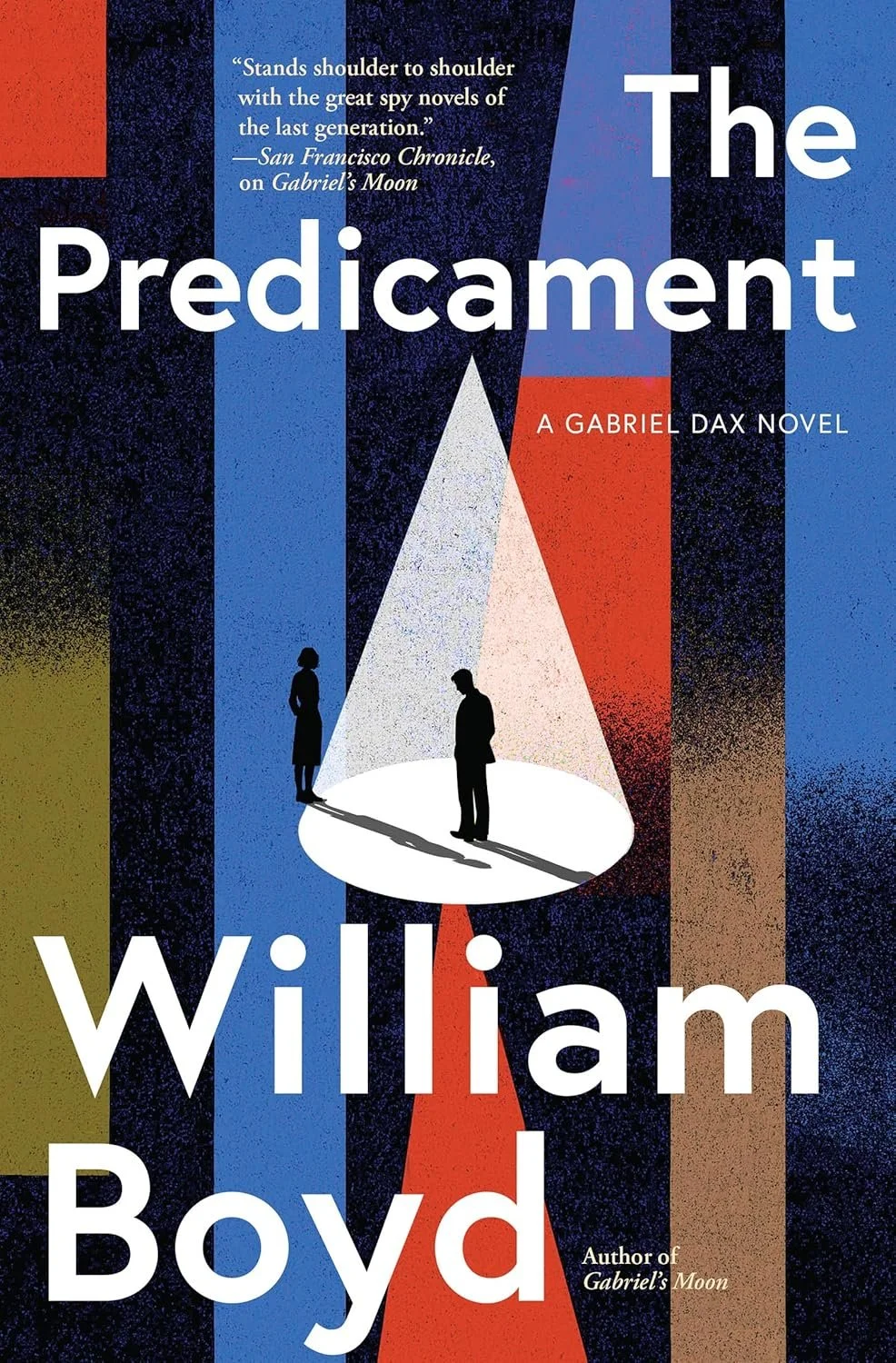The Predicament by William Boyd
/The Predicament: A Gabriel Dax Novel
By William Boyd
Atlantic Crime 2025
Pencils shiver and goiters wobble as literature’s newest spy novel comes eeling onto the scene. William Boyd’s sharabang of long-pleased fans will no doubt dominate the queues, but readers unfamiliar with his work fearing exclusivity and conceited in-jokes can also make a becalmed purchase. Though Boyd giggles atop a successful oeuvre, The Predicament works hard so as to be read as an isolated new entity whilst smothering us all with the genre’s regular archetypes. Deals are made by the dodgy and the dangerous behind a restaurant menu’s glossy lamination, triple strength drink comes readily from waiters’ wrists, the sweetness of the sixties is puckered in via toothsome cigarettes, a protagonist moves handsomely womanward and foreign shakers take lead to the face from prone assassins in this the zippiest of new releases.
The main man whose head we inhabit throughout - Gabriel Dax - is first a literary figure writing cutely idiosyncratic travel books for a pleased publisher. When he isn’t talking to the KGB on MI6’s behalf, he’s thinking up riverine metaphors and grimacing at the world in aesthetic dispassion. He comes out with some very quaint stuff: “There are more things in heaven and earth, Horatio, than are dreamt of in your philosophy. Hamlet. His favourite quote from Shakespeare.” Sometimes Gabriel gives the lines without identifying their proprietor. Like in West Berlin - “It was strange being in this curious enclave of twentieth century capitalism in a communist country. A capsule of hope in a sclerotic body, somebody had said. Who was it? Bertrand Russell, Thomas Mann, Arthur Koestler…?” On and on in four or five timezones this jukebox of lettered hits plays his tune.
The heady Dax is maybe the first reluctant spy this scribbling critic has encountered. Effective in a squirrely, undying way on the job, he loves nothing more than to feel his hearthside rug under his tootsies and to hear the satiated meow of his independent cat. “As ever” writes Boyd after Gabriel has snuck from Guatemala “he was glad to be back in Rose Cottage. He felt more and more that the place was coming to represent his old life - agreeably - of writing and reading and familiar routine. London was now the focus of his other, unsought-for parallel life: fraught, annoying, perplexing, duplicitous.” How realistically refreshing to be spared the usual spy’s unending adventurism. How nice to have Gabriel Dax slump back into microwave-tinging normality as would a lumberjack or a baker of oaty bread. Add to this the scenes showing a baffled Gabe being trained in combat and covert pursuit, and our cheeky favourite has his coltish essence brilliantly solidified.
Of course, no spy novel can consider itself inducted among its brethren until a lustily flagrant romantic interest has been commissioned. Boyd’s women are a marvel of steadfast agency. MI6 bigwig Faith Green doesn't hang her whole existence on Gabriel’s approval - “They had experienced an intense moment, true, they had been lovers, but now she was engaged to be married…They could still be friends, she hoped. But her life as his handler - his puppet-mistress, as he termed her - had to continue, she said, regardless of our feelings.” Neither is the German-American contact Parker Baumgarten simply a pleasure dome on legs. Even the hometown squeeze Lorraine, as she throws herself upon Gabriel, is afforded dignity. There are no Bond girls here folks.
Judged aside from its subject matter, The Predicament bobs afloat some gainfully readable prose. Swaying drunkenly from the fabulous to the seriously flawed, it is as if a committee of glum rogues, talented post-graduates and missionaries of mediocrity were all set loose on this changeable appearance. Here’s what Boyd can do at his best: “‘Is that coat mink?’ he asked, wanting to say something chattily bland, trying to seem unperturbed by her presence, though his mind was already noisy with unanswered questions.” Yet space-fillers, such as the quotation to come, deaden the text with anemic complacency: “There was the [pub] - [Gabriel] felt a surge of happiness. He would enjoy getting slightly drunk tonight, he thought: the Guatemala chapter of his life over and done with, the wound well healed.”
Generously thought of by some as raw and sparse, this barren directness of voice does at least beaver the story along from one dawn raid to the next. In fact, this book is so brief that summer travellers could turn to page one as the boosters hummed in Heathrow and be finished by the time the border authorities in Tenerife were scanning their underpants for amphetamines.
Despite the stylistic clangers and the unbelievable way in which a flimsy litterateur is said to suddenly outdo the CIA, The Predicament will definitely have both Boyd’s faithful clientele and more casual readers of his output speeding - mouth agape - to its tense conclusion. John F Kennedy’s persuasive smile is threatened by shooters in West Berlin as Boyd deviously replicates the wild theories brought about by the events of November 22nd 1963. Arriving at the final pages, scintillated readers can only count on good fortune or the amateur wile of Gabriel Dax if tragedy is to be averted.
Joe Spivey is a book critic currently residing in Kingston upon Hull
